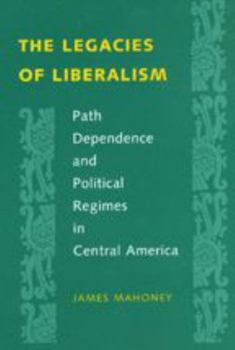The Legacies of Liberalism: Path Dependence and Political Regimes in Central America
Select Format
Select Condition 
Book Overview
Winner of the Barrington Moore Jr. Prize for the Best Book in Comparative and Historical Sociology from the American Sociological AssociationWinner of the Best Book Award in the Comparative Democratization Section from the American Political Science Association
Despite their many similarities, Central American countries during the twentieth century were characterized by remarkably different political regimes. In a comparative analysis of Guatemala, El Salvador, Costa Rica, Honduras, and Nicaragua, James Mahoney argues that these political differences were legacies of the nineteenth-century liberal reform period. Presenting a theory of "path dependence," Mahoney shows how choices made at crucial turning points in Central American history established certain directions of change and foreclosed others to shape long-term development.
By the middle of the twentieth century, three types of political regimes characterized the five nations considered in this study: military-authoritarian (Guatemala, El Salvador), liberal democratic (Costa Rica), and traditional dictatorial (Honduras, Nicaragua). As Mahoney shows, each type is the end point of choices regarding state and agrarian development made by these countries early in the nineteenth century. Applying his conclusions to present-day attempts at market creation in a neoliberal era, Mahoney warns that overzealous pursuit of market creation can have severely negative long-term political consequences.
The Legacies of Liberalism presents new insight into the role of leadership in political development, the place of domestic politics in the analysis of foreign intervention, and the role of the state in the creation of early capitalism. The book offers a general theoretical framework that will be of broad interest to scholars of comparative politics and political development, and its overall argument will stir debate among historians of particular Central American countries.
Related Subjects
Americas Central America Comparative Politics Democracy Education & Reference El Salvador Elections & Political Process Guatemala History Honduras Ideologies & Doctrines Legal Theory & Systems Modern (16th-21st Centuries) Nicaragua Non-US Legal Systems Political Parties Political Science Politics & Government Politics & Social Sciences




